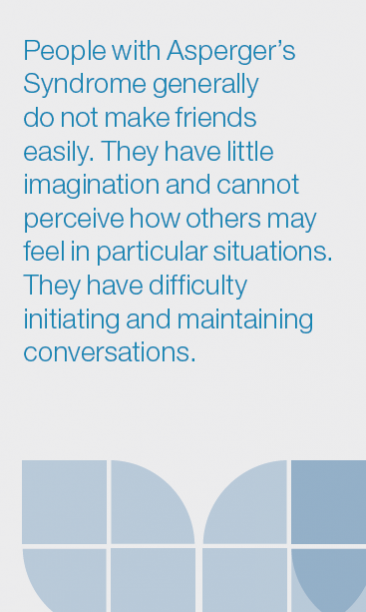Asperger’s Syndrome is an Autism Spectrum Disorder and is 4 times more common in males than females. It is characterized by an inability to fit into peer groups due to a lack of social skills and language skills. It is sometimes considered that higher functioning Autism is equivalent to Asperger’s Syndrome.
People with Asperger’s Syndrome generally do not make friends easily. They have little imagination and cannot perceive how others may feel in particular situations. They have difficulty initiating and maintaining conversations.
They rarely use facial expressions, gestures, and intonation and will not necessarily understand other’s use of non-verbal communication and body language. They may develop odd, repetitive movements, e.g. finger twisting. And may develop rituals that they refuse to alter, e.g. getting dressed in a particular order. Some people with Asperger’s Syndrome have extraordinary memory and may develop intense interests in a few areas, e.g. weather patterns. Many find it difficult to generalize learned skills and therefore need to relearn procedures. They need to be prepared for any changes in routine and rely on structure and predictability. They also do not necessarily understand the concept of cooperative play.
Programming Considerations
- Sport and active recreation games and social skills need to be taught.
- Written instructions may assist comprehension.
- Speech is taken very literally so metaphors need to be explained clearly.
- A person may focus on specific objects and may not want to part with them, so be understanding of wanting to keep items.
Strategies for Inclusion
- Structured activities and small groups will work best.
Behavior Management Issues
- Repetition and familiarity makes the participant feel safe so when distressed the individual may relax when allowed to indulge in repetitive interests.
(Source – Amaze Fact Sheets)
Further information
Amaze – www.amaze.org.au

